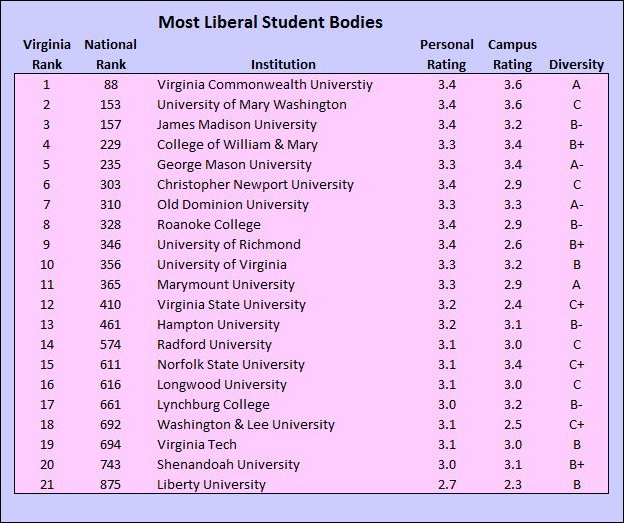by James A. Bacon
Following up on our conversation about the demands made by black Virginia Commonwealth University students, I stumbled across this data compiled by the Niche.com college ranking website. I was startled to find that the VCU student body ranked itself as the most liberal of any college or university in Virginia — and the 88th most liberal among the 880 colleges surveyed. VCU also got the highest score for diversity of any Virginia institution (tied with Marymount University).
African-American students invaded the VCU president’s office Thursday and issued demands for more African-American professors, more funding for African-American cultural programs, and implementation of a “cultural competency” course for all students. VCU President Michael Rao engaged in a respectful, two-hour dialogue with the protesters.
I find it fascinating that this surge of unrest by African-American students — fueled, they say, by their alienation from campus life — occurred on the campus that is the most diverse and the most liberal of any university in Virginia. (Read here the methodology behind Niche.com’s survey, and how it included only those institutions with statistically meaningful results.)
One is prompted by these numbers to ask where the feelings of alienation come from.
Can VCU be said, by any objective measure, to be a hostile or even an indifferent place for minority students when the university rates an “A” for diversity? That is hard to swallow. Niche.com’s diversity rating gives 20% weight to the percentage of international students, 20% to racial diversity of the student body, 20% to student survey characterizations of the institution, 15% to the percentage of out-of-state students, 10% to faculty diversity, and smaller percentages to gender and socio-economic diversity. (See the methodology here.) Whatever flaws VCU may have, it cannot be said that the university administration lacks a commitment to diversity.
Can it be said that African-American students feel excluded by other members of the student body — that they are marginalized by other students’ racist attitudes? One reason to suspect otherwise is the fact that only half the student body (51%) is white and nearly one-fifth (18%) of the student body is African-American, with significant percentages of Asians and Hispanics. Not only are whites less predominant than at other college campuses, those whites likely are more liberal minded than white students generally. Unless we accept the proposition that self-professed white liberals are closet racists, this explanation does not hold water. (Caveat: We have to be careful drawing hard-and-fast conclusions about student attitudes given the modest size of the Niche.com survey samples and the inevitable margin for error.)
I would propose a different explanation: that the alienation expressed by a relatively small number of African-American students at VCU — about 30, who may or may not be representative of the larger African-American student body — stems not from VCU’s insufficient commitment to diversity or the racist attitudes of a non-dominant white student body, but the ideology of victimization and grievance that is intrinsic to liberalism in the ivory tower. African-American students at VCU — or at least the students participating in the protest — feel alienated because the peculiar form of liberalism that prevails on college campuses fosters alienation. Fifty years of failed liberal policies have done nothing to lessen the breadth or intensity of African-American poverty in America, but rather than admit the unintended consequences of social engineering, liberals in academia have doubled down on the racism paradigm. Thus, they seize upon ever more subtle manifestations of racism, as evidenced by the recent distress over “micro-aggressions” on college campuses.
Of course, liberals will take issue with my analysis. If past is prologue, some will insinuate that I am racist for criticizing the liberal paradigm — in other words, I’ll be tarred with the “R” word not because I am antagonistic in any way toward African-Americans but because I entertain different ideas of how to bring them into the mainstream of American society. My deeply held hope is that America one day can become a country where racism disappears, where the historic legacy of slavery and Jim Crow are overcome, and where every child has an opportunity to succeed regardless of the color of his or her skin. I just don’t think we get closer to those goals by cultivating victimization and grievance. As long as universities continue to do so, they will remain reservoirs of African-American discontent.



